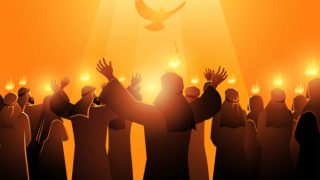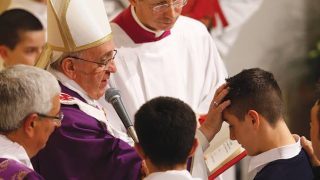
THE PROPHET’S CANDLE: A SYMBOL OF HOPE
HOMILY FOR THE FIRST SUNDAY OF ADVENT, YEAR A. Readings: Isaiah 2:1-5; Psalm 122; Romans 13:11-14 and Matthew 24:37-44.
The first Sunday of Advent rekindles the light of hope in the midst of darkness and it begins a new liturgical calendar in the Church. Advent has its origin from the Latin word “Adventus,” meaning “Coming,” which is a translation of the Greek word “parousia”. It is a season of preparation for the celebration of God’s incarnation, that is, Christmas. This season, we patiently and vigilantly wait for the coming of Christ in three dimensions.
The first is his coming in incarnation: historically Christ took flesh and dwelt among us; the second is his constant coming to us in sacrament; and the third is his coming in Majesty, which expresses the second coming of Christ. The season is divided into two parts: the first Sunday of Advent to 16th of December emphasizes on the second coming of Christ, that is, the parousia. While 17th to 24th December emphasizes on the coming of the Messiah in the flesh, the Incarnation.
This season of advent comes with a new look in the Church’s liturgy. The Liturgical colour is changed to purple or violet and the Advent Wreath, which is a circle of evergreen branches with four candles on it, is placed in a position visible for all to see. The circular shape of the Wreath that has neither beginning nor end symbolizes eternity of God, who has neither beginning nor end. It represents the immortality of the soul and everlasting life we find in Jesus Christ. Each Sunday, one of the candles is lit either before or at the beginning of the Mass. Practically we have four Sundays/weeks in advent and each candle symbolically represent each week.
As hope symbolically represent the first advent candle, the first reading from the prophet Isaiah presents to us the hope of the Messiah’s reign. When Isaiah said, “It shall come to pass in the latter days…” he refers to the “time of the Messiah,” when the anointed of the Lord reigns over the earth. Broadly, this speaks of the time many refer to as the millennium, the thousand year reign of Jesus on earth (Is 11:4-9; Lk 1:32-33). The New Testament uses the phrases “the last days” or “the end of time” in eschatological sense (Acts 2:17;; 2 Tim 3:1). The vision that Isaiah shares in these verses is a statement of certainty that history will reach its goal, its culmination. That goal is the reign of God that will involve the utter transformation of nationalism and conflicts to unity and peace.
In the reign of the Messiah, the prophet says, “Nations shall not lift up sword against nation, neither shall they learn war anymore” (v.4). We long for the day when there is no more need for military budget, when the money that goes for weapons and armies can go to schools, parks and other peaceful pleasures of life. We can only have this lasting peace when the Messiah reigns among us and over our nations. Isaiah challenges us to walk in the light of the Lord. This means to order our lives after the ways of the Lord and to enjoy the blessings of the Messiah’s reign. If we can do so, we can give light to other people and nations who seats in darkness.
To have Christ reign in our hearts and nation, the second reading and gospel invites us to keep watch, “For Salvation is nearer to us now than when we first believed; the night is far gone, the day is at hand. Let us then cast off the works of darkness and put on the armour of light…” (Rm. 13:12-13). It is possible to do many Christian or religious things and yet be asleep towards God just as some persons talk, walk and do all sorts of things while sleeping. Invariably, it is not enough to cast off the works of darkness. We must put on the armour of light to prevent the darkness from returning. It is important for every Christian to make sure that they are truly awake and active in their life before God. The works of darkness as mentioned in the reading are not appropriate for Christians who have come out of the night into God’s light. Paul admonishes us to behave honorably, honestly and decently, for such behavior is appropriate for who we are; “we are children of light and not of darkness” (1 Thess. 5:5). Nothing turns people away from Christ like a person who claims to be a child of light but behaves like a child of darkness. Nothing attracts people like a person of faith who loves them as Christ taught us to love and whose life bears stamp of integrity. Paul invites us to walk properly with the Lord as Enoch and Noah walked with God in Gen 5:22,24; 6:9.
In keeping watch, Christ in the gospel reminds us how it was in the days of Noah, so will be the coming of the Son of man. Christ compared the normalcy of the people’s daily lives with the normalcy that will prevail before the second coming which are eating and drinking, marrying and giving in marriage. The fault is not that people were doing these things, but that they are so caught up in the routine of daily living that they take no thought for their spiritual lives. Their problem is not gross sin but secular difference or nonchalance about God. Those in the days of Noah were warned and judgment eventually came. To those who have ignored the warning, it came suddenly and unexpectedly, and so Christ cautioned his disciples to be ready for the unexpected coming.
In a nutshell, the liturgy of today invites us to prepare and wait in hope for the coming of our Savior in glory, honour and power. He will come again. His coming will be swift and surprising; he will divide people into two groups (taken/left behind). So we had better be ready. If we focus on readiness, we need not worry about the details, we can trust him to get the details right and if so, his coming will definitely culminate in an outburst of great joy. Maranatha!
God bless you!
Fr. Ken Dogbo, OSJ










